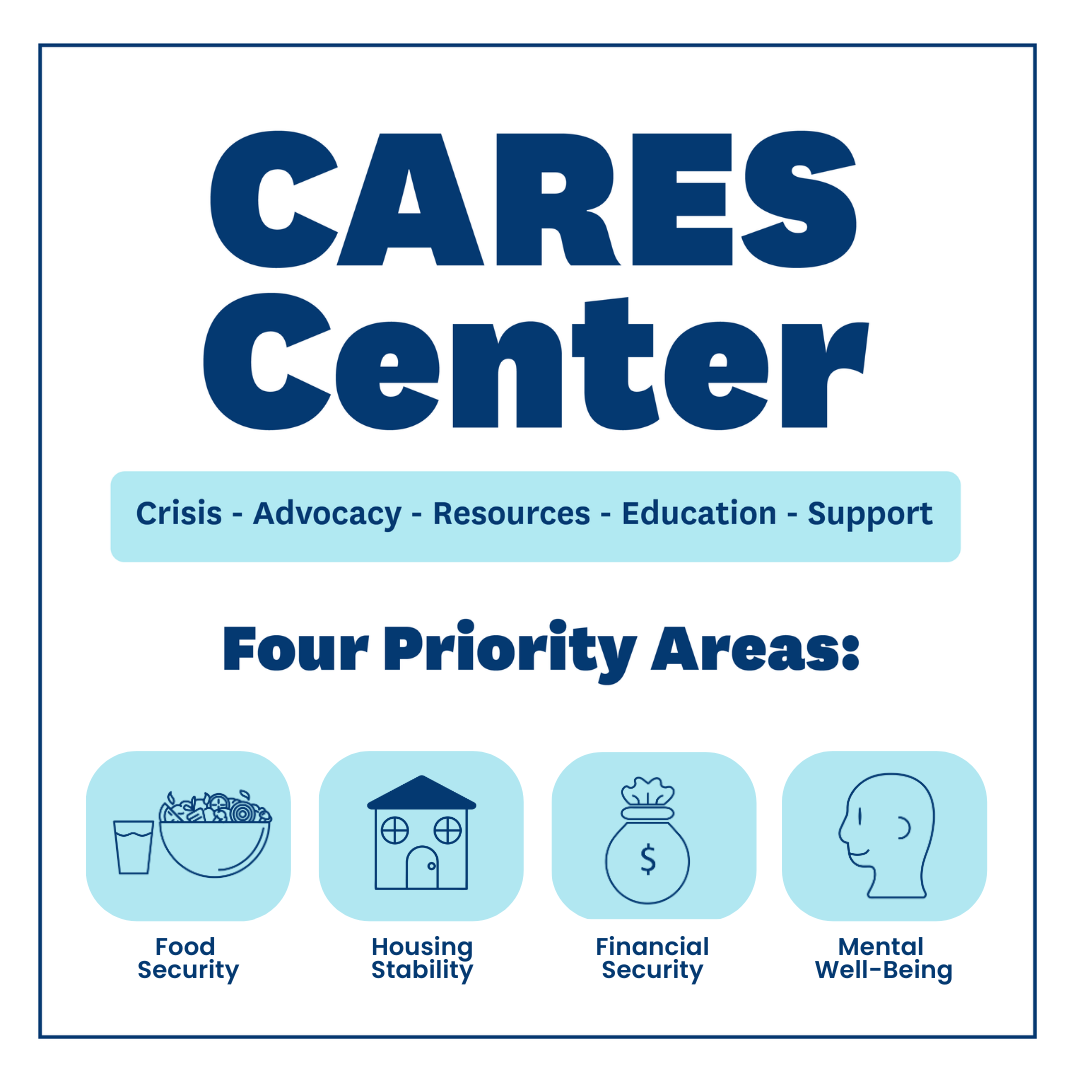Under-utilization of resources
In our three years of existence, the CARES Center has provided support to over 3,300 students via our case management services, Flashes Food Pantry, Swipe Out Hunger and emergency mini grant.
While that number is significant, it is far below the rate of students who are experiencing basic-need challenges. Thanks to the national research done by The Hope Center at Temple University, we know that the most common barriers to students accessing basic-need resources include lack of awareness of resources, scarcity concerns and availability concerns.
Given this information, as a CARES Center, we want to provide some additional information and specifically share about how we are addressing these concerns and misconceptions. We hope to set the record straight on these, and other, concerns and misconceptions.
Background
Before we address concerns and misconceptions, let’s talk about why this matters. For the last decade or more, starting way back in the pre-TikTok era, higher education institutions across the country have identified the increasing challenges facing college students.
Kent State University’s 2016 climate study, in addition to many other studies nationwide since that time, have reflected these challenges: stable housing, consistent access to food, accessible mental health care, reliable transportation and technology, among others. Additional data from The Hope Center shows as many as three out of four students will face basic-need insecurity during their time enrolled in college.
In other words, if you’re struggling college student, you’re not alone.
As a result, Kent State University founded the CARES Center in the spring of 2021. At that time, the CARES Center’s specific focus was on assisting students in four areas: housing, food, mental wellbeing and financial security. Since its start, the CARES Center has become a common referral for students facing basic-need challenges and other difficulties, including, providing resources and connections for:
- Identifying, understanding and connecting with campus resources
- SNAP (food stamps)
- Medicaid
- Medical/Mental health care expenses
- Transportation needs
- Affordable technology resources
- Supportive employment programs
- Basic independent living skills
- and more!
Awareness
Increasing students’ awareness of any program or service on campus is always challenging.
Remember playing dodgeball in school and doing everything you could to be inconspicuous — it’s kind of the opposite of that. We’re out here waving our arms, flaunting our data and saying, “Look at me! Come talk to me!”
Students sit through hours of presentations during Destination Kent State and Transfer Kent State, receive mountains of information about campus during Flashes 101 and are inundated with emails from various university departments, student organizations and other campus resources. So, we are always open to feedback from you! If you have ideas on how we can spread the word, hit us up on Insta @KentStateCARES, or if you’re old school, send us an email at [email protected].
And most importantly, tell your friends on campus about us!
Scarcity
One in four college students do not take advantage of basic-need resources out of concern that other students need the resources more, according to The Hope Center.
We love you all for your concern for others, but you matter too! College is hard enough with being independent for the first time, being in an unfamiliar setting, needing to develop new social relationships and find your place, among all the other practical and academic challenges.
Don’t make your journey more difficult by convincing yourself that you don’t deserve support. It isn’t the suffering Olympics; there’s no gold medal for not seeking support when you need it.
Availability
Another one in four students do not seek support because of the belief that student support resources are limited.
The resources on dating apps are also limited, but that doesn’t stop you from trying, does it? And sure, student support resources certainly aren’t infinite, but there are a great number of resources available to many students. At the CARES Center, we have the privilege of partnering with the academic colleges and programs, identity and cultural departments, student wellness programs and One Stop — not to mention local, state and national resources to support our students.
Each of the resources we partner with establishes eligibility criteria to determine who qualifies. Those criteria are meant to make the resources last, no matter how limited or bountiful. So, think of us as your resource matchmakers. We take some of the guesswork out of it!
“I didn’t know who to ask.”
In my own work with students, I hear this often.
As I get to know students and try to identify all their pressing needs, I inevitably hear some iteration of, “Well, [insert challenge] has been an issue [for a while / since I started college / for a long time], but I didn’t know who to ask for help, so I didn’t.”
It can be hard, uncomfortable and scary to ask for help, particularly for an issue that you might feel shame, guilt or embarrassment about. In the most empathetic way possible, I beg you, ask anyway! There truly are so many people willing and able to help you across campus — but they can’t help if they don’t know you need it. Just like you can’t get that free piece of cake if you don’t tell the server it’s your birthday (we promise not to sing to you!).
Plus, self-advocacy is one of the most important skills you can develop that your future self will thank you for!
Other reasons to seek support
Advocacy for yourself and others:
Utilizing resources demonstrates student need and provides more accurate data for us, and other student supporters on campus, to advocate for more resources.
If more students used campus resources, we could show the need for more of those resources, financial and otherwise.
Fight the stigma:
There is no denying that a stigma still exists around help seeking. The truth is students struggling to meet their basic needs reflect a national environment on college campuses in which the support ecosystem is insufficient for student success. Every student who expresses need and accesses available resources chips away at that stigma.
Tips for seeking support
Start by asking: If you don’t know what help you need, or where to go to get it, start by asking a trusted person on campus. If you haven’t found that kind of relationship with any campus staff or faculty, reach out to us!
You don’t need to know what help you’re looking for: If you’re experiencing a new challenge or hardship, it’s difficult to know what type of support you need and what support exists. If you can share what your challenge is, chances are, folks on campus know some of the support available or another knowledgeable staff member to connect you with.
Don’t be deterred: In a perfect world, you’d never have to ask more than once. But sometimes, you will have to. If you don’t find the answer you’re looking for the first time, don’t stop asking.
What students say
Lastly, I want to leave you with feedback provided by your peers who have used the CARES Center:
“You truly do make me feel like you care about each and every student at the university!”
“I really appreciate your attentiveness and thoughtfulness, it really does make a world of difference, especially in an environment where it is easy to feel like just another number…”
“Thank you and the CARES Center staff for taking care of me in such a horrendous time in my life.”
“I was able to get back up on my feet rather quickly thanks to them. Reaching out to the CARES center was the best thing I could have done for myself.”
The CARES Center can be contacted in-person in Suite 106 of the Kent Student Center, by calling 330-672-7575, by email [email protected], or through our website: www.kent.edu/carescenter.






















